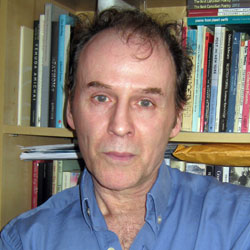I find webpages and see the faces
of two of your now forty-something siblings,
and imagine how you looked in middle age.
Study even the obituary notice picture
of your mother, seventy-eight, for clues.
But you are twenty-two. It is late summer,
you are wearing white pants, a simple blouse,
you stand at a distance and smile slightly,
and let me take a photograph of you.
You are there in sunlight, in my cells –
you are there, you are twenty-two.
Meals I did not sit and eat with you,
and my food and drink without you now,
all of it nourishment for the cells –
the cells vanished along with what they held
of what I was and what I knew of you
and since replaced with new cells,
and the cells still here, which will vanish.
I saw somewhere among a poet’s lines,
What is not of flesh, we won’t remember.
And I know that the cells of the body
both remember and disavow the body.
And the living flesh is its testimony
that it can only remember then forget.
And the sunlight falling all around you
is timeless, blameless, and continues falling.
And what is of the body, we will remember
because it is what we can possess, though it can’t last.
And what is not of the body, if we imagine
it is another body that can only remember –
even then it can’t save us. The body will forget us,
and if the spirit can tell us it knows us,
or which among the scattering and fading cells
comprised us, we won’t be there to hear it.
Far inside the cells of my body now,
where I am only barely a body, in sunlight
you are twenty-two, and you remember and forget,
and you arrive neither to fulfill touch
nor invisibly hold sway, and you step toward me.
Notes on the Poem
Through repetition that verges on the hypnotic at some points, Russell Thornton explores the mystery and conundrum that is memory in his poem "Cells" from his 2015 Griffin Poetry Prize shortlisted collection "The Hundred Lives". Although not as intricate as the strict sestina, "Cells" is reminiscent of the form with its six stanzas and, most importantly, its pervasive and at times almost incantatory repetition. The words "you", "now", "remember", "forget", "body" and the eponymous "cells" are combined and recombined as the poem's narrator circles around and around his memories of someone beloved and desired, and as those memories shift back and forth in time. That those memories are evoked by sources ranging from mental images to obituary notice pictures to webpages suggests that the repositories of those memories can be as much pixels as cells. What is forgotten? What is remembered? How and at what levels do things slip from our minds or do we choose to let them leave, as "disavow" suggests? How and at what levels do we manage to hold onto things, in our hearts and in our minds? Early on, the narrator recalls that "you stand at a distance", but comfortingly, at the end ..."you step toward me". Thornton captures our questions about the power of memory in a unique and poignant fashion.
